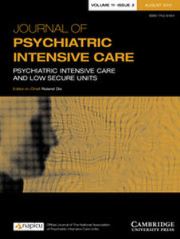Article contents
Factors influencing acuity within inpatient mental health care
Published online by Cambridge University Press: 10 April 2007
Abstract
The literature describes increasing acuity on inpatient psychiatric wards. This pressure is sometimes implicated in reduced effectiveness of service delivery. Policy changes have resulted in the gradual reduction in the number of inpatient beds. This has been supported by an increase in community mental health service provision with the community now being the preferred setting. This paper reviews current literature to debate the concept of acuity and its usefulness for mental health care in the UK. The findings suggest the concept of acuity can be misleading for services. The effectiveness of inpatient care is dependent on numerous factors, of which acuity is only one component. To focus on acuity as a measure of inpatient care detracts energy and resources from those factors which can impact on and improve inpatient mental health care and serves only to blame service users for being too ill for the service to cope with.
- Type
- Research Article
- Information
- Copyright
- Copyright © NAPICU 2007
- 1
- Cited by




